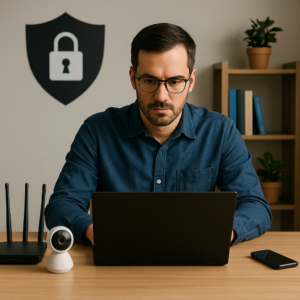As remote work continues to become the norm, ensuring your home office security is more important than ever. Many small business owners and remote professionals underestimate how vulnerable their home setups can be to cyber threats. Criminals are increasingly targeting remote workers, making protecting your systems and data critical.
A recent cyberattack against Marks & Spencer shows how disruptive these threats can be. After being targeted, the company had to shut down remote access for employees to prevent further damage to its systems (source). This real-world example highlights the urgent need for strong home office security measures. This guide will walk you through five powerful strategies to secure your home office like a cybersecurity pro.
1. Strengthen Your Wi-Fi Network
Wi-Fi is the first defense for your home office security, and a vulnerable network can expose your entire digital environment. Start by changing the default router password to something strong and unique, combining upper- and lower-case letters, numbers, and special characters. Enable the latest encryption standard, preferably WPA3, which offers stronger security protections than older protocols like WPA2. To further deter potential attackers, consider hiding your network name (SSID) so it does not appear publicly, and limit the number of devices allowed to connect. Regularly reboot your router and update its firmware to patch any known vulnerabilities, keeping your home office network secure against evolving cyber threats.
2. Use a Virtual Private Network (VPN)
A VPN encrypts your internet traffic, ensuring that sensitive information stays protected from cybercriminals, internet service providers, and even malicious actors on public Wi-Fi networks. Incorporating a VPN into your home office security setup is a simple yet highly effective way to shield your browsing history, financial data, and confidential work communications from unauthorized access. Beyond security, a VPN also provides an added layer of privacy, masking your IP address and making it more difficult for hackers to trace your online activities. For optimal protection, choose a VPN provider with strong encryption protocols, a no-logs policy, and high-speed performance without sacrificing security.
3. Install Endpoint Protection Software
Antivirus and anti-malware tools are essential for maintaining strong home office security, providing a crucial barrier against a wide range of cyber threats such as viruses, spyware, ransomware, and phishing attacks. Choose a reputable endpoint protection solution with features like real-time monitoring to detect and neutralize threats immediately, automatic updates to protect you against the latest vulnerabilities, and advanced ransomware protection to safeguard your important files. Many modern endpoint security suites also offer additional capabilities like firewall management, secure browsing tools, and device control options, making them a comprehensive choice for securing your home office environment.
4. Enable Two-Factor Authentication (2FA)
Passwords alone aren’t enough to safeguard your systems, especially as cybercriminals continually develop more sophisticated methods to crack or steal credentials. Enhancing your home office security with two-factor authentication (2FA) adds an essential second layer of protection, requiring users to provide two forms of identification before accessing sensitive accounts or systems. Even if a hacker obtains your password, 2FA ensures they cannot gain entry without the secondary verification, such as a code sent to your mobile device or a fingerprint scan. Implementing 2FA across all critical services, from email to cloud storage, greatly strengthens your overall security posture and minimizes the risk of a devastating breach.
5. Regularly Update Devices and Software
Keeping your operating systems, applications, and firmware up to date is critical for home office security, as outdated software often contains vulnerabilities that cybercriminals actively exploit. Regular updates patch these security gaps, strengthen system defenses, and enhance performance. Set your devices and software to update automatically whenever possible, and make it a habit to check for updates if automatic options are unavailable manually. Staying current with updates significantly reduces your risk of falling victim to malware, ransomware, and other evolving cyber threats targeting remote workers.
Securing your remote workspace doesn’t have to be overwhelming. Taking a few proactive steps can dramatically improve your home office security and protect your personal and professional information from cyber threats. Each small change you implement today can prevent major security headaches.
We’d love to hear how you’re strengthening your home office security! Please share your tips or questions in the comments below. Don’t forget to subscribe to our newsletter for more expert cybersecurity advice and practical strategies delivered straight to your inbox.
#CyberSecurity, #SmallBusiness, #RemoteWork, #HomeOfficeSecurity, #WorkFromHome, #CyberAwareness, #DataProtection, #SecurityTips, #InfoSec, #OnlineSafety
